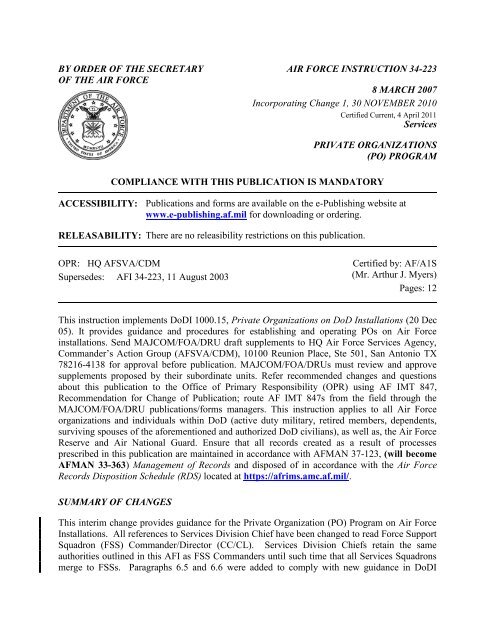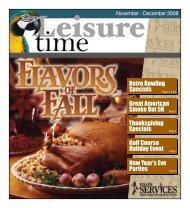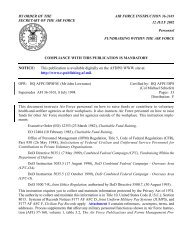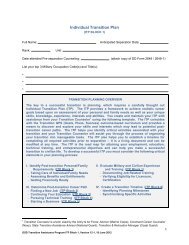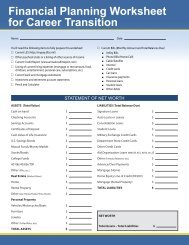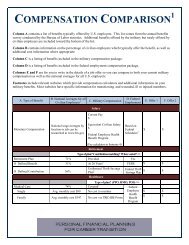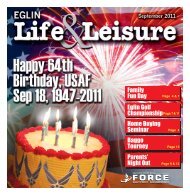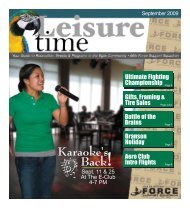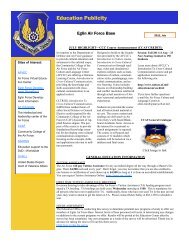AFI 34-223 - Welcome to Joint Base Langley-Eustis
AFI 34-223 - Welcome to Joint Base Langley-Eustis
AFI 34-223 - Welcome to Joint Base Langley-Eustis
You also want an ePaper? Increase the reach of your titles
YUMPU automatically turns print PDFs into web optimized ePapers that Google loves.
BY ORDER OF THE SECRETARY<br />
OF THE AIR FORCE<br />
AIR FORCE INSTRUCTION <strong>34</strong>-<strong>223</strong><br />
8 MARCH 2007<br />
Incorporating Change 1, 30 NOVEMBER 2010<br />
Services<br />
PRIVATE ORGANIZATIONS<br />
(PO) PROGRAM<br />
COMPLIANCE WITH THIS PUBLICATION IS MANDATORY<br />
ACCESSIBILITY: Publications and forms are available on the e-Publishing website at<br />
www.e-publishing.af.mil for downloading or ordering.<br />
RELEASABILITY: There are no releasibility restrictions on this publication.<br />
OPR: HQ AFSVA/CDM<br />
Supersedes: <strong>AFI</strong> <strong>34</strong>-<strong>223</strong>, 11 August 2003<br />
Certified by: AF/A1S<br />
(Mr. Arthur J. Myers)<br />
Pages: 12<br />
This instruction implements DoDI 1000.15, Private Organizations on DoD Installations (20 Dec<br />
05). It provides guidance and procedures for establishing and operating POs on Air Force<br />
installations. Send MAJCOM/FOA/DRU draft supplements <strong>to</strong> HQ Air Force Services Agency,<br />
Commander’s Action Group (AFSVA/CDM), 10100 Reunion Place, Ste 501, San An<strong>to</strong>nio TX<br />
78216-4138 for approval before publication. MAJCOM/FOA/DRUs must review and approve<br />
supplements proposed by their subordinate units. Refer recommended changes and questions<br />
about this publication <strong>to</strong> the Office of Primary Responsibility (OPR) using AF IMT 847,<br />
Recommendation for Change of Publication; route AF IMT 847s from the field through the<br />
MAJCOM/FOA/DRU publications/forms managers. This instruction applies <strong>to</strong> all Air Force<br />
organizations and individuals within DoD (active duty military, retired members, dependents,<br />
surviving spouses of the aforementioned and authorized DoD civilians), as well as, the Air Force<br />
Reserve and Air National Guard. Ensure that all records created as a result of processes<br />
prescribed in this publication are maintained in accordance with AFMAN 37-123, (will become<br />
AFMAN 33-363) Management of Records and disposed of in accordance with the Air Force<br />
Records Disposition Schedule (RDS) located at https://afrims.amc.af.mil/.<br />
SUMMARY OF CHANGES<br />
Certified Current, 4 April 2011<br />
This interim change provides guidance for the Private Organization (PO) Program on Air Force<br />
Installations. All references <strong>to</strong> Services Division Chief have been changed <strong>to</strong> read Force Support<br />
Squadron (FSS) Commander/Direc<strong>to</strong>r (CC/CL). Services Division Chiefs retain the same<br />
authorities outlined in this <strong>AFI</strong> as FSS Commanders until such time that all Services Squadrons<br />
merge <strong>to</strong> FSSs. Paragraphs 6.5 and 6.6 were added <strong>to</strong> comply with new guidance in DoDI
2 <strong>AFI</strong><strong>34</strong>-<strong>223</strong> 8 MARCH 2007<br />
1000.15, Procedures and Support for Non-Federal Entities Authorized <strong>to</strong> Operate on DoD<br />
Installations. Paragraphs 10.1. – 10.1.1.4. were deleted and replaced with paragraphs 10.1. –<br />
10.1.2.3. <strong>to</strong> comply with new guidance in DoDI 1000.15, Procedures and Support for Non-<br />
Federal Entities Authorized <strong>to</strong> Operate on DoD Installations; allowing the use of the name or<br />
abbreviation of DoD, DoD components, organizational units and installations in PO names.<br />
Paragraph 10.7.3 defines requirements for submitting financial statements <strong>to</strong> the FSS Resource<br />
Management Office (FSS/FSR, formerly Resource Management Flight Chief (RMFC)).<br />
Paragraph 10.13. identifies the responsibility for obtaining tax-exempt information and forms.<br />
Section A—General<br />
1. Private Organizations (POs). POs are self-sustaining special interest groups, set up by<br />
people acting exclusively outside the scope of any official capacity as officers, employees, or<br />
agents of the Federal Government. They operate on Air Force installations with the written<br />
consent of the installation commander.<br />
1.1. POs are not Federal entities and are not <strong>to</strong> be treated as such. Accordingly, they are not<br />
NAF instrumentalities (N<strong>AFI</strong>s) as defined in <strong>AFI</strong> <strong>34</strong>-201, Use of Nonappropriated Funds,<br />
nor are they entitled <strong>to</strong> the sovereign immunities and privileges given <strong>to</strong> N<strong>AFI</strong>s or the Air<br />
Force.<br />
1.2. Personal and professional participation in POs is governed by DoD 5500.7-R, <strong>Joint</strong><br />
Ethics Regulation.<br />
2. Applicability.<br />
2.1. The following organizations are not considered POs and are governed by DoD<br />
Directives (DoDDs) and Instructions (DoDIs) as referenced:<br />
2.1.1. Scouting organizations operating at US military installations located overseas<br />
(DoD Instruction 1015.9, (e), Professional United States Scouting Organization<br />
Operations at United States Military Installations Located Overseas).<br />
2.1.2. American National Red Cross (DoDD 1330.5, American National Red Cross).<br />
2.1.3. United Seaman’s Service (DoDD 1330.16, United Seaman’s Service (USS)).<br />
2.1.4. United Service Organizations, Inc. (DoDD 1330.12, United Service Organizations,<br />
Inc.).<br />
2.1.5. Credit Unions (DoDD 1000.11, Financial Institutions on DoD Installations).<br />
2.1.6. Banks (DoDD 1000.11, Financial Institutions on DoD Installations).<br />
2.2. Small unofficial activities (like coffee funds, flower funds, sunshine funds, and other<br />
small operations) are generally not considered POs. However, if their current assets (which<br />
include cash, inven<strong>to</strong>ries, receivables, and investments) exceed a monthly average of $1,000<br />
over a 3-month period, the activity/organization must become a PO, discontinue on-base<br />
operations, or reduce its current assets below the $1,000 threshold.<br />
Section B—What People Do
<strong>AFI</strong><strong>34</strong>-<strong>223</strong> 8 MARCH 2007 3<br />
3. The Direc<strong>to</strong>r of Services (HQ USAF/A1S). AF/A1S issues guidance and provides oversight<br />
for POs.<br />
4. HQ Air Force Services Agency, Commander’s Management Support (HQ<br />
AFSVA/CDM). HQ AFSVA/CDM gives operations guidance <strong>to</strong> POs.<br />
5. Major Command Chief of Services (MAJCOM/A1S), Field Operating Agency (FOA),<br />
Direct Reporting Unit (DRU). MAJCOM/A1S/FOA/DRUs ensure that installation-level FSS<br />
follow the procedures outlined in this <strong>AFI</strong>.<br />
6. Installation Commander:<br />
6.1. Authorizes the establishment and operation of a PO when he/she determines it will<br />
make a positive contribution <strong>to</strong> the quality of life of base personnel. The commander may<br />
withdraw the authorization if the PO prejudices or discredits the United States Government,<br />
conflicts with Government activities, or for any other reason or just cause.<br />
6.2. Authorizes contrac<strong>to</strong>r and subcontrac<strong>to</strong>r POs when justified, as long as the interests of<br />
the Air Force are fully protected in the authorizing documents.<br />
6.3. Takes action on requests for fundraisers.<br />
6.4. May delegate the above authorities <strong>to</strong> the Mission Support Group Commander. The<br />
authority <strong>to</strong> approve or disapprove fundraisers may be further delegated <strong>to</strong> the FSS<br />
Commander/Direc<strong>to</strong>r (FSS CC/CL).<br />
6.5. May direct a PO <strong>to</strong> eliminate duplication of services, particularly when these services<br />
compete with the installation’s nonappropriated fund revenue-generating activities.<br />
6.6. Ensures background checks are completed for employees and volunteers of POs who<br />
have contact with children under the age of 18 in DoD-operated, -contracted, or communitybased<br />
programs that are used <strong>to</strong> supplement or expand child care or youth services, according<br />
<strong>to</strong> DoD Instruction 1402.5 (Reference (i)).<br />
7. Force Support Squadron Commander/Direc<strong>to</strong>r:<br />
7.1. Moni<strong>to</strong>rs and administers the PO Program. Ensures the membership provisions and the<br />
basis upon which the organization was permitted <strong>to</strong> operate on the installation continue <strong>to</strong><br />
apply. Advises the installation commander if changed conditions by the PO warrant further<br />
review, documentation, and reconsideration for continued permission <strong>to</strong> operate on the<br />
installation.<br />
7.2. Ensures the Resource Management Flight Chief (RMFC) keeps a file on each PO.<br />
7.3. Moni<strong>to</strong>rs unofficial activities/organizations.<br />
8. Resource Management Flight Chief. Keeps a file on each PO and reviews each PO<br />
annually at the close of the PO’s fiscal year <strong>to</strong> ensure financial statements, documents, records,<br />
and procedures outlined in the PO Guide (https://wwwr.afsv.af.mil/_AFSVA/Publications.htm#privateorgs)<br />
and this <strong>AFI</strong> are in order.<br />
Section C—Establishing, Operating, and Dissolving a PO Activity<br />
9. Setting Up a PO. A PO must submit a written constitution, bylaws, or other similar<br />
documents, outlined in the PO Guidance Handbook through the FSS/FSR, FSS/CC/CL and Staff
4 <strong>AFI</strong><strong>34</strong>-<strong>223</strong> 8 MARCH 2007<br />
Judge Advocate for consideration by the installation commander. DoD personnel acting in an<br />
official capacity may not execute such constitutions, bylaws, or similar documents or submit<br />
them for approval, with the exception of the individuals mentioned above who are part of the<br />
formal submission process. The constitution, bylaws, or similar documents must:<br />
9.1. Address the nature, function, objectives, membership eligibility, and sources of income<br />
of the PO.<br />
9.2. Provide certification <strong>to</strong> FSS/FSR indicating that PO members have been notified and<br />
understand their personal financial liability for obligations of the PO, as provided by law.<br />
9.3. Describe the responsibilities of PO officers for asset accountability, liability satisfaction,<br />
and sound financial and operational management.<br />
9.4. Provide specific guidance on disposition of residual assets upon dissolution.<br />
NOTE:<br />
A PO may dispose of its assets only in the manner outlined in its constitution, bylaws, or similar<br />
documentation. If the proper provisions exist, a PO may give residual assets <strong>to</strong> the Air Force or a<br />
N<strong>AFI</strong> in accordance with <strong>AFI</strong>s 51-601, Gifts <strong>to</strong> the Department of the Air Force, and <strong>34</strong>-201,<br />
Use of Nonappropriated Funds (NAFs). Neither appropriated fund (APF) activities nor N<strong>AFI</strong>s<br />
may claim the assets of, or make or assume any obligation for, a PO except those that may arise<br />
from a valid contract between them.<br />
9.5. Be updated every two years or when there is a change in the purpose, function, or<br />
membership eligibility of the PO, whichever comes first.<br />
10. Operating a PO. Installation commanders provide limited supervision over POs. Their<br />
control lies in the power <strong>to</strong> authorize and withdraw authorization for these organizations <strong>to</strong><br />
operate on the installation. They ensure compliance with the requirements of this instruction, but<br />
do not control or dictate internal activities or structure of POs.<br />
10.1. To prevent the appearance of an official sanction or support by the DoD.<br />
10.1.1. POs may not use the seals, logos, or insignia of the DoD or any DoD Component,<br />
DoD organizational unit, or DoD installation on organization letterhead, correspondence,<br />
titles, or in association with organization programs, locations, or activities.<br />
10.1.1.1. DELETED.<br />
10.1.1.2. DELETED.<br />
10.1.1.3. DELETED.<br />
10.1.1.4. DELETED.<br />
10.1.2. POs operating on DoD installations may use the name or abbreviation of the<br />
DoD, an Air Force organizational unit, or installation in the PO name provided that the<br />
status as a PO is apparent and unambiguous and there is no appearance of official<br />
sanction or support by the DoD. The following applies:<br />
10.1.2.1. POs must have written approval from the installation commander before<br />
using the name or abbreviation of the installation or organizational unit. Requests for<br />
use of the DoD or Air Force name or abbreviation must be routed through the<br />
MAJCOM/A1S <strong>to</strong> HQ AFSVA/CDM.
<strong>AFI</strong><strong>34</strong>-<strong>223</strong> 8 MARCH 2007 5<br />
10.1.2.2. Any use of the name or abbreviation of an Air Force organizational unit, or<br />
installation must not mislead members of the public <strong>to</strong> assume a PO is an<br />
organizational unit of the Air Force.<br />
10.1.2.3. POs must prominently display the following disclaimer on all print and<br />
electronic media mentioning the PO’s name confirming that the PO is not part of the<br />
DoD: ―THIS IS A PRIVATE ORGANIZATION. IT IS NOT A PART OF THE<br />
DEPARTMENT OF DEFENSE OR ANY OF ITS COMPONENTS AND IT HAS<br />
NO GOVERNMENTAL STATUS.‖<br />
10.2. POs may not discriminate in hiring practices or membership policies on the basis of<br />
age, race, religion, color, national origin, disability, ethnic group, or gender. Anyone who<br />
suspects unlawful discrimination by POs should contact the local Equal Opportunity<br />
Counselor and follow the procedures in <strong>AFI</strong> 36-1201, Discrimination Complaints.<br />
10.2.1. POs may organize around a cultural or ethnic focus as long as they do not restrict<br />
their membership on the basis of culture or ethnicity.<br />
10.3. POs may not haze or harass (either physically or mentally) as part of their initiation<br />
rites.<br />
10.4. Religiously oriented POs may be authorized <strong>to</strong> operate on installations if:<br />
10.4.1. Requests by similar organizations are also approved.<br />
10.4.2. Authorization is for non-exclusive use of government facilities.<br />
10.4.3. No sign or insignia or other organizational identification is placed on or inside<br />
government facilities except when the organization’s activities are in progress.<br />
10.4.4. Membership is not restricted <strong>to</strong> members of the religion involved.<br />
10.4.5. The installation staff chaplain coordinates on the request.<br />
10.5. POs must be self-sustaining, primarily through dues, contributions, service charges,<br />
fees, or special assessments of their members. There will be no financial assistance <strong>to</strong> a PO<br />
or unofficial activity/organization from a N<strong>AFI</strong> in the form of contributions, repairs, services,<br />
dividends, or donations of money or other assets.<br />
10.5.1. POs must properly plan and adequately control the money aspects of their goals<br />
and objectives, including cash and other assets.<br />
10.5.2. Income must not accrue <strong>to</strong> individual members except through wages and salaries<br />
for PO employees or other payment for services rendered <strong>to</strong> the PO or military<br />
community. Any income will be derived primarily for offsetting expenses of operation,<br />
which may include competitive awards or charitable contributions. As an exception,<br />
installation commanders may authorize investment-oriented POs if they comply with all<br />
other provisions of this <strong>AFI</strong>.<br />
10.6. POs must use budgets and financial statements as financial management <strong>to</strong>ols.<br />
Additional financial requirements are listed in the Private Organization Guide.<br />
10.6.1. The budget details financial plans for annual operations. It includes projected<br />
activities (income and expense) and capital purchases (equipment and property). The<br />
budget establishes financial objectives <strong>to</strong> generate sufficient income <strong>to</strong> offset planned
6 <strong>AFI</strong><strong>34</strong>-<strong>223</strong> 8 MARCH 2007<br />
expenses. Comparing actual results with the budget helps indicate management<br />
performance.<br />
10.6.2. POs must prepare an income-and-expense statement, either on an accrual or cash<br />
basis. The income and expense statement reflects monetary events that have occurred<br />
during a given period.<br />
10.6.3. POs must also prepare a balance sheet that accounts for <strong>to</strong>tal assets, liabilities and<br />
net worth (equity) of the PO’s financial condition on a given date.<br />
10.7. POs with certain levels of gross annual revenue must undergo audits and financial<br />
reviews at the PO’s own expense:<br />
10.7.1. Certified Public Accountants (CPAs) perform annual audits of POs with gross<br />
annual revenues of $250,000 or more. Use of a Certified Government Financial Manager<br />
is permitted in overseas locations when the RMFC documents that a CPA is not<br />
available.<br />
10.7.2. Accountants (CPA not required) perform annual financial reviews of POs with<br />
gross annual revenues of $100,000, but less than $250,000. Accountants conduct these<br />
reviews and provide written verification of the accounting data and other relevant<br />
information.<br />
10.7.3. POs that have gross annual revenues of less than $100,000, but more than $5,000,<br />
normally are not required <strong>to</strong> conduct an independent audit or financial review. However,<br />
such POs must provide an annual financial statement <strong>to</strong> FSS/FSR NLT 20 days following<br />
the end of the PO’s fiscal year.<br />
10.7.4. If there are signs of fraud or other improprieties, regardless of the amount of<br />
revenue, the FSS/CC/CL advises the installation commander. The installation<br />
commander should request an audit from the Air Force Audit Agency, which may<br />
schedule the review within available resources.<br />
10.7.5. The audit (which generally provides more detailed information) and the financial<br />
review must verify the PO has:<br />
10.7.5.1. A uniform system of accounting.<br />
10.7.5.2. Consolidated reports of the accounting system in<strong>to</strong> meaningful summaries.<br />
10.7.5.3. Identified areas of weakness and plan(s) for corrective action.<br />
10.7.6. POs must implement internal control procedures that ensure:<br />
10.7.6.1. Adequate segregation of duties.<br />
10.7.6.2. Proper procedures for authorizations.<br />
10.7.6.3. Adequate documents and records.<br />
10.7.6.4. Physical control over assets and records.<br />
10.7.6.5. Independent checks on performance.<br />
10.8. POs and unofficial activities/organizations must not engage in activities that duplicate<br />
or compete with activities of the Army and Air Force Exchange Services (AAFES) or<br />
Services N<strong>AFI</strong>s.
<strong>AFI</strong><strong>34</strong>-<strong>223</strong> 8 MARCH 2007 7<br />
10.9. POs and unofficial activities/organizations will not operate amusement machines, slot<br />
machines, or any other games of chance (except as authorized in paragraph 10.16, below);<br />
nor will they engage in frequent or continuous resale activities either directly, through third<br />
parties, or in their media (e.g., newsletters, handouts, posters, special-order brochures,<br />
websites, etc.).<br />
10.9.1. The installation commander may authorize (may delegate <strong>to</strong> the Mission Support<br />
Group Commander or the FSS/CC/CL) continuous thrift shop sales operations and<br />
occasional events for fundraising purposes (e.g., bake sales, dances, carnivals, car<br />
washes, or similar functions) which the PO or unofficial activity conducts directly,<br />
through a third party, or its media. Approval is required for POs or unofficial activities<br />
whether the fund raiser is conducted on or off installation. ―Occasional‖ is defined as not<br />
more than two per calendar quarter. The prohibition against frequent or continuous resale<br />
activities does not preclude collective purchasing and sharing of purchased items by<br />
members of POs or unofficial activities so long as there is no actual resale. See <strong>AFI</strong> 36-<br />
3101, Fundraising within the Air Force, for fundraising authority during the Combined<br />
Federal Campaign.<br />
10.9.2. The occasional sales limitation for funding does not apply <strong>to</strong> PO sales of Air<br />
Force School or unit souvenirs or memorabilia <strong>to</strong> members of the school or unit involved,<br />
provided AAFES or Services resale activities elect not <strong>to</strong> provide this service and the PO<br />
chartering documentation authorizes resale under these circumstances.<br />
10.9.3. POs and unofficial activities/organizations operating on an Air Force installation<br />
are prohibited from engaging in any conduct which has the effect of advertising for,<br />
making referrals <strong>to</strong>, or encouraging use of any commercial business concerns. The only<br />
exception <strong>to</strong> this policy is when a PO or unofficial activity/organization conducts an<br />
approved fund-raising event through a third-party (e.g., the spouses club conducts an art<br />
sale as an approved fund‐ raiser and contracts with an art dealer (third party) <strong>to</strong> provide<br />
the artwork <strong>to</strong> be sold).<br />
10.10. POs and unofficial activities/organizations may not sell or serve alcoholic beverages.<br />
10.11. POs must have liability insurance unless the Installation Commander waives the<br />
requirement. Insurance should be required unless the activities of the PO are such that the<br />
risk of liability is negligible. PO members must be made aware that they are jointly and<br />
severally liable for the obligations of the PO, and their understanding of the liability must be<br />
documented. The absence of liability insurance places their personal assets immediately at<br />
risk in the event of PO liability. Forward all waiver requests through the servicing legal<br />
office prior <strong>to</strong> approval. This waiver authority may be delegated <strong>to</strong> the Mission Support<br />
Group Commander. No further delegations are authorized. The commander or delegees may<br />
waive the requirement for continuous liability coverage; however, the approval document<br />
must advise the PO that the commander may still require liability insurance for specific<br />
events that involve a greater risk of injury or damage. Insurance waivers must be reevaluated<br />
annually.<br />
10.12. The PO should consider bonding for its treasurer. The treasurer is in a sensitive<br />
position, especially if handling and controlling large amounts of cash. POs may make a<br />
bonding determination by weighing the cost of commercial fidelity insurance protection from<br />
a qualified underwriter against the potential dollar risk.
8 <strong>AFI</strong><strong>34</strong>-<strong>223</strong> 8 MARCH 2007<br />
10.13. POs and unofficial activities must comply with all applicable federal, state, local, and<br />
foreign laws governing like civilian activities. Some POs may qualify for tax-exempt status.<br />
It is the responsibility of the PO or unofficial activity <strong>to</strong> obtain proper tax-exempt<br />
information and forms through the regional Internal Revenue Service office and the state<br />
taxing authority.<br />
10.14. PO officers and members must report any signs of fraud or other improprieties <strong>to</strong> the<br />
FSS/CC/CL.<br />
10.15. PO officer and member and unofficial activities/organization actions must not<br />
prejudice or discredit the United States Government or conflict with governmental activities.<br />
10.15.1. POs and unofficial activities/organizations may not solicit funds for their<br />
organization on base.<br />
10.15.1.1. Services may not co-sponsor events with POs or unofficial<br />
activities/organizations for the purpose of obtaining commercial sponsorship,<br />
contributions, donations, gifts, advertising or generating revenue for them.<br />
10.15.1.2. POs and unofficial activities/organizations are not authorized use of the<br />
DoD MWR Commercial Sponsorship policy.<br />
10.15.1.3. POs and unofficial activities/organizations may accept gifts and donations.<br />
These organizations will not solicit gifts or donations on base. Off-base solicitations<br />
must clearly indicate that they are for a PO or an unofficial activity/organization, and<br />
not for the base or any official part of the Air Force. Donor/gift recognition may not<br />
be made publicly. Recognition of the gift or donation can only be made <strong>to</strong> members<br />
of the PO or those present at an event benefiting from the donation/gift.<br />
10.15.1.3.1. POs and unofficial activities/organizations are prohibited from<br />
actions, which make it appear that the installation is endorsing or giving special<br />
treatment <strong>to</strong> the donors/givers involved.<br />
10.15.2. POs may not conduct games of chance, lotteries, raffles, or other gambling-type<br />
activities except as provided in paragraph 10.16 Unofficial activities/organizations may<br />
not conduct games of chance, lotteries, raffles, or other gambling-type activities under<br />
any circumstances.<br />
10.16. Those POs which are composed primarily of DoD personnel or their family members<br />
may conduct fund-raising raffles on an Air Force installation on an occasional, infrequent<br />
basis when authorized in advance by the installation commander or designee subject <strong>to</strong> the<br />
limitations detailed below. Such raffles provide a means of extending needed services or<br />
other assistance <strong>to</strong> members of the DOD family, but failure <strong>to</strong> strictly follow the provisions<br />
below could result in the raffles violating the general gambling prohibition in DoD 5500.7-R,<br />
<strong>Joint</strong> Ethics Regulation (JER), 30 Aug 93. All requests <strong>to</strong> conduct raffles must be reviewed<br />
by the servicing Judge Advocate’s office. Raffles must:<br />
10.16.1. Not violate the law of the city, county, state, or country in which the installation<br />
is located and comply with any applicable requirements of such laws, e.g., securing<br />
required licenses or permits, filing application documents and/or reports, and the like.<br />
10.16.2. Be for the benefit of DoD personnel or their family members. Raffles may not<br />
be authorized <strong>to</strong> raise money for local or national groups such as a regional or national
<strong>AFI</strong><strong>34</strong>-<strong>223</strong> 8 MARCH 2007 9<br />
Heart or Cancer Association whose funds would not benefit primarily DoD personnel or<br />
their family members.<br />
10.16.2.1. In evaluating PO raffle fund-raising requests, installation commanders<br />
must consider the proposed use of the proceeds and may approve only those requests<br />
which serve a charitable, civic, or other community welfare purpose within the DoD<br />
community and which directly benefit DoD personnel or their family members. For<br />
example, commanders may approve raffles when the proceeds would be used for new<br />
playground equipment at a child development center or new furnishings at a youth<br />
center; <strong>to</strong> fund scholarship programs for DoD personnel and their family members; <strong>to</strong><br />
donate money <strong>to</strong> base scouting organizations; or <strong>to</strong> provide food, clothing, shelter, or<br />
other relief <strong>to</strong> needy DoD personnel or their families.<br />
10.16.2.2. Raffle requests <strong>to</strong> raise funds for purely social, recreational, or<br />
entertainment purposes which benefit only individual PO members and/or their<br />
family members, such as <strong>to</strong> underwrite the cost of a weekend ski trip, a sight-seeing<br />
<strong>to</strong>ur, or a shopping excursion will not be approved.<br />
10.16.2.3. Requests for approval <strong>to</strong> conduct raffles must identify the purpose for<br />
which funds are being raised and the intended beneficiaries of the proceeds. They<br />
must also identify how the PO will ensure the proceeds are used only for that purpose<br />
and those beneficiaries.<br />
10.16.3. Not be officially endorsed or supported except as permitted by sections 3-210<br />
and 3-211 of the JER.<br />
10.16.4. Not be conducted in the workplace. With installation commander or designee<br />
approval, they may be conducted at public entrances and in community support facilities<br />
such as the lobby of the <strong>Base</strong> Exchange. Raffles on the Pentagon reservation are<br />
prohibited.<br />
10.16.5. Not be conducted by military members or civilian employees during their duty<br />
time. Military members may not conduct raffles while in uniform at any time. Air Force<br />
personnel may participate in PO fundraising raffles only in a purely personal, unofficial,<br />
volunteer capacity at authorized locations and in ways that do not imply official<br />
endorsement.<br />
11. Logistical Support. POs must furnish their own equipment, supplies, and other materials.<br />
Newly elected PO officers must consult FSS/FSR for guidance and training on local installation<br />
requirements and procedures because POs generally do not get either APF or NAF support<br />
except where specifically identified in this <strong>AFI</strong>.<br />
11.1. POs may be provided places <strong>to</strong> conduct meetings of reasonable duration and<br />
frequency.<br />
11.1.1. A PO must reimburse for services (<strong>to</strong> include utilities) when it uses a facility or<br />
space on an other-than-occasional basis unless a separate directive or instruction<br />
authorizes non-reimbursable support. Thrift shops are exempted from the requirement <strong>to</strong><br />
pay utilities. A PO must reimburse for any additional costs incurred by the Air Force<br />
resulting from such uses, e.g., incremental increases in maintenance and jani<strong>to</strong>rial<br />
expenses.
10 <strong>AFI</strong><strong>34</strong>-<strong>223</strong> 8 MARCH 2007<br />
11.1.2. The Air Force mandates an approved outgrant when a PO has exclusive use of a<br />
facility, space, or land area. Any reimbursement for utilities will be determined in<br />
accordance with <strong>AFI</strong> 32-1061, Providing Utilities <strong>to</strong> US Air Force Installations. Any<br />
reimbursement for space occupied, maintenance, and other support will be determined in<br />
accordance with <strong>AFI</strong> 32-9003, Granting Temporary Use of Air Force Real Property.<br />
11.1.3. The use of Government equipment and systems for other than official purposes is<br />
extremely limited. Government systems (daily bulletin boards and or electronic public<br />
folders) may be used <strong>to</strong> provide notice of unofficial off-installation fundraising<br />
campaigns and volunteer requests if approved by the Installation Commander. In no<br />
event should official email, mail, computers, copiers, BITS, etc., be used <strong>to</strong> provide<br />
notice of these type of activities.<br />
11.2. POs in overseas areas can request additional support such as reimbursable<br />
transportation services; commissary; Armed Forces postal services; exchange; recreational<br />
activity privileges; reimbursable space-available hospitalization, medical, and dental care;<br />
and dependent school service. Requests must be forwarded through the installation<br />
commander <strong>to</strong> the MAJCOM/A1S. As part of the forwarding recommendation, the<br />
installation commander must include a statement acknowledging the commander can provide<br />
the additional support requested within available resources and without degrading the<br />
installation’s ability <strong>to</strong> fulfill its mission. The request must include:<br />
11.2.1. A cost estimate for the additional support.<br />
11.2.2. A list of services, programs, and activities the PO provides that warrant<br />
additional support.<br />
11.2.3. An acknowledgement by the PO that additional support may be terminated if the<br />
PO’s services, programs, and activities change so that they no longer warrant the support.<br />
12. Dissolution of a PO. When A PO decides <strong>to</strong> dissolve or shut down, it must:<br />
12.1. Use its funds <strong>to</strong> satisfy any outstanding debts, liabilities, or obligations.<br />
12.2. Dispose of the residual balance as decided by the PO membership.<br />
12.3. Notify the FSS/CC/CL of the intent <strong>to</strong> dissolve the PO and prepare a time-phased<br />
action plan <strong>to</strong> do so.<br />
ROGER A. BRADY, Lt General, USAF<br />
DCS, Manpower and Personnel
<strong>AFI</strong><strong>34</strong>-<strong>223</strong> 8 MARCH 2007 11<br />
References<br />
Attachment 1<br />
GLOSSARY OF REFERENCES AND SUPPORTING INFORMATION<br />
DoD Instruction, 1000.15, Private Organizations on DoD Installations, 20 Dec 05<br />
DoD Instruction 1015.9, Professional United States Scouting Organization Operations at United<br />
States Military Installations Located Overseas, 31 Oct 90<br />
DoD 5500-7-R, <strong>Joint</strong> Ethics Regulation (JER), 30 Aug 93, with changes 1 through 6<br />
DoD 7000.14-R, Vol 11A, Chapter 4, User Charges<br />
<strong>AFI</strong> 32-1061, Providing Utilities <strong>to</strong> US Air Force Installations<br />
<strong>AFI</strong> 32-9003, Granting Temporary Use of Air Force Real Property<br />
<strong>AFI</strong> <strong>34</strong>-201, Use of Nonappropriated Funds (NAFs)<br />
<strong>AFI</strong> 36-3101, Fundraising within the Air Force<br />
AFMAN 37-123, (will become AFMAN 33-363)<br />
<strong>AFI</strong> 51-601, Gifts <strong>to</strong> the Department of the Air Force<br />
Abbreviations and Acronyms<br />
AAFES—Army and Air Force Exchange Service<br />
<strong>AFI</strong>—Air Force Instruction<br />
AFPD—Air Force Policy Directive<br />
AFSVA—Air Force Services Agency<br />
AFSVA/CDM—Air Force Services Agency/Commander’s Management Support<br />
APF—Appropriated Funds<br />
CPA—Certified Public Accountant<br />
DoD—Department of Defense<br />
HQ—Headquarters<br />
HQ USAF/A1S—Air Force Direc<strong>to</strong>r of Services<br />
JER—<strong>Joint</strong> Ethics Regulation<br />
MAJCOM—Major Command<br />
MAJCOM/A1S—Major Command/Chief of Services<br />
MWR—Morale, Welfare, and Recreation<br />
NAF—Nonappropriated Fund<br />
N<strong>AFI</strong>—Nonappropriated Fund Instrumentality<br />
PO—Private Organization
12 <strong>AFI</strong><strong>34</strong>-<strong>223</strong> 8 MARCH 2007<br />
RMFC—Resource Management Flight Chief<br />
USAF—United States Air Force


